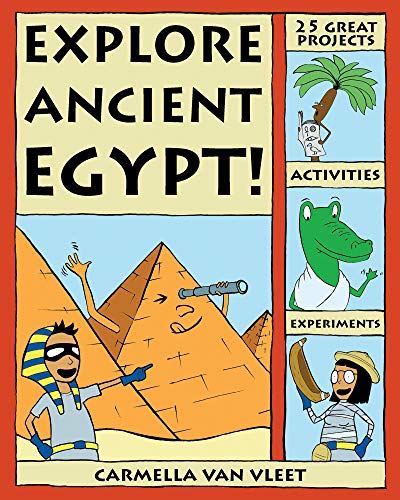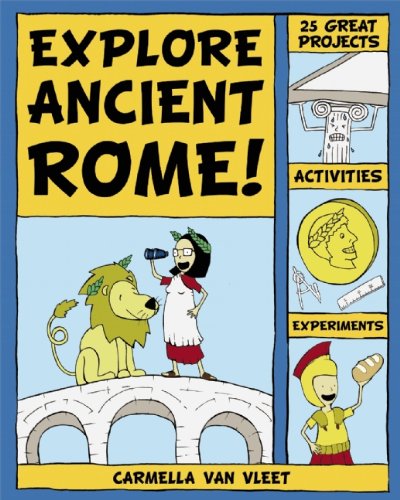-
Explore Ancient Egypt!: 25 Great Projects, Activities, Experiments
Carmella Van Vleet, Alex Kim
Paperback (Nomad Press, Nov. 1, 2006)Pyramids, mummies, amulets, temples, and pharaohs Explore Ancient Egypt! brings this fascinating civilization to young readers ages 69 with 25 hands-on projects, activities, and games. Kids learn about ancient Egyptian homes, food, money, toys, games, makeup, clothes, kings, mummies, and more. Projects are easy to follow and require primarily common household products and very little adult supervision.Activities range from making a scarab necklace to writing in ancient Egyptian hieroglyphs and making King Tut sandals. By combining a hands-on element with riddles, jokes, facts, and comic cartoons, kids Explore Ancient Egypt! in this accessible introduction to an incredible, ancient world. M
M
-
Explore Ancient Rome!: 25 Great Projects, Activities, Experiements
Carmella Van Vleet, Alex Kim
Paperback (Nomad Press, March 1, 2008)Investigate the fascinating civilization of ancient Rome through 25 hands-on projects and activities for young readers ages 69. Kids learn about ancient Roman homes, food, playtime, clothing, conquests, gods, entertainment, and more. Activities range from creating an amphora and making a tunic to baking bread and hosting a Roman feast. By combining a hands-on element with riddles, jokes, fun facts, and comic cartoons, kids Explore Ancient Rome! and develop an understanding of how this ancient civilization laid the foundation of our modern world. N
N
-
Explore Ancient Greece!: 25 Great Projects, Activities, Experiments
Carmella Van Vleet, Alex Kim
Paperback (Nomad Press, June 1, 2008)Investigate the fascinating civilization of ancient Greece through 25 hands-on projects and activities for young readers ages 6-9. Kids learn about ancient Greek homes, food, playtime, clothing, conquests, arts and entertainment, gods, and more. Activities range from fashioning a model oil lamp from clay to building a courtyard column and constructing a flipbook sailing ship. By combining a hands-on element with riddles, jokes, fun facts, and comic cartoons, kids Explore Ancient Greece! and develop an understanding of how this ancient civilization still influences our modern world. N
N
-
Explore Colonial America!: 25 Great Projects, Activities, Experiments
Verna Fisher, Bryan Stone
Paperback (Nomad Press, Aug. 1, 2009)In Explore Colonial America!, kids ages 6-9 learn about America’s earliest days as European settlements, and how the colonists managed to survive, build thriving colonies, and eventually challenge England for independence.How did the colonists build homes, feed and clothe themselves, and get along with the Native Americans who were already here? This accessible introduction to the colonial period teaches young children about the daily lives of ordinary colonists and offers fascinating stories about those who helped shape the emerging nation. Activities range from creating a ship out of a bar of soap and building a log home out of graham crackers and pretzels to making a wampum necklace. Projects are easy-to-follow, require minimal adult supervision, and use primarily common household products and recycled supplies.By combining a hands-on element with riddles, jokes, fun facts, and comic cartoons, kids Explore Colonial America!, and have a great time discovering our nation’s founding years. M
M
-
Explore Ancient Greece!: 25 Great Projects, Activities, Experiments
Carmella Van Vleet, Alex Kim
eBook (Nomad Press, July 1, 2008)Investigate the fascinating civilization of ancient Greece through 25 hands-on projects and activities for young readers ages 6-9. Kids learn about ancient Greek homes, food, playtime, clothing, conquests, arts and entertainment, gods, and more. Activities range from fashioning a model oil lamp from clay to building a courtyard column and constructing a flipbook sailing ship. By combining a hands-on element with riddles, jokes, fun facts, and comic cartoons, kids Explore Ancient Greece! and develop an understanding of how this ancient civilization still influences our modern world.
-
Explore Ancient Greece!: 25 Great Projects, Activities, Experiments
Carmella Van Vleet, Alex Kim
eBook (Nomad Press, July 1, 2008)Investigate the fascinating civilization of ancient Greece through 25 hands-on projects and activities for young readers ages 6-9. Kids learn about ancient Greek homes, food, playtime, clothing, conquests, arts and entertainment, gods, and more. Activities range from fashioning a model oil lamp from clay to building a courtyard column and constructing a flipbook sailing ship. By combining a hands-on element with riddles, jokes, fun facts, and comic cartoons, kids Explore Ancient Greece! and develop an understanding of how this ancient civilization still influences our modern world.
-
Explore Ancient Egypt!: 25 Great Projects, Activities, Experiments
Carmella Van Vleet, Alex Kim
eBook (Nomad Press, Jan. 1, 2008)Pyramids, mummies, amulets, temples, and pharaohs— Explore Ancient Egypt! brings this fascinating civilization to young readers ages 6–9 with 25 hands-on projects, activities, and games. Kids learn about ancient Egyptian homes, food, money, toys, games, makeup, clothes, kings, mummies, and more. Projects are easy to follow and require primarily common household products and very little adult supervision.Activities range from making a scarab necklace to writing in ancient Egyptian hieroglyphs and making King Tut sandals. By combining a hands-on element with riddles, jokes, facts, and comic cartoons, kids Explore Ancient Egypt! in this accessible introduction to an incredible, ancient world.
-
Explore Ancient Rome!: 25 Great Projects, Activities, Experiements
Carmella Van Vleet, Alex Kim
eBook (Nomad Press, March 1, 2008)Investigate the fascinating civilization of ancient Rome through 25 hands-on projects and activities for young readers ages 69. Kids learn about ancient Roman homes, food, playtime, clothing, conquests, gods, entertainment, and more. Activities range from creating an amphora and making a tunic to baking bread and hosting a Roman feast. By combining a hands-on element with riddles, jokes, fun facts, and comic cartoons, kids Explore Ancient Rome! and develop an understanding of how this ancient civilization laid the foundation of our modern world.
-
Explore Water!: 25 Great Projects, Activities, Experiments
Anita Yasuda, Bryan Stone
Paperback (Nomad Press, June 1, 2011)DripDropSplash! Water is essential to all forms of life. Explore Water! 25 Great Projects, Activities, Experiments, captures a child’s imagination with an intriguing look at the world of water.Combining hands-on activities with history and science, kids will have fun learning about the water cycle, water resources, drinking water and sanitation, water pollution and conservation, water use, water folklore and festivals, and the latest in water technology. Entertaining illustrations and fascinating sidebars illuminate the topic and bring it to life, while Words to Know highlighted and defined within the text reinforce new vocabulary.Projects include a nilometer, a rain harvester made out of plastic containers, a transpiration experiment, and a mini water wheel. Auxiliary materials include a glossary, and a list of current reference works, websites, museums, and science centers. N
N
-
Explore Life Cycles!: 25 Great Projects, Activities, Experiments
Kathleen M. Reilly, Bryan Stone
Paperback (Nomad Press, March 1, 2011)Explore Life Cycles! takes kids on an amazing journey, where they'll learn about the changes plants and animals experience throughout their lives. Kids ages 69 will discover what happens inside those magical cocoons to transform a caterpillar into a butterfly. They'll explore how frogs breathe underwater as tadpoles, then use lungs as an adult. Explore Life Cycles! will examine how plants and animals are born, develop, and live their lives.Activities range from creating edible life cycles of insects to making a mealworm nursery. Using an eye-catching combination of cartoons, fun facts, and exciting projects, Explore Life Cycles! will bring the mysteries of life right into kids’ hands. N
N
-
Explore Ancient Egypt!: 25 Great Projects, Activities, Experiments
Carmella Van Vleet, Alex Kim
eBook (Nomad Press, Jan. 1, 2008)Pyramids, mummies, amulets, temples, and pharaohs Explore Ancient Egypt! brings this fascinating civilization to young readers ages 69 with 25 hands-on projects, activities, and games. Kids learn about ancient Egyptian homes, food, money, toys, games, makeup, clothes, kings, mummies, and more. Projects are easy to follow and require primarily common household products and very little adult supervision.Activities range from making a scarab necklace to writing in ancient Egyptian hieroglyphs and making King Tut sandals. By combining a hands-on element with riddles, jokes, facts, and comic cartoons, kids Explore Ancient Egypt! in this accessible introduction to an incredible, ancient world.
-
Explore Water!: 25 Great Projects, Activities, Experiments
Anita Yasuda, Bryan Stone
eBook (Nomad Press, June 1, 2011)DripDropSplash! Water is essential to all forms of life. Explore Water! 25 Great Projects, Activities, Experiments, captures a child’s imagination with an intriguing look at the world of water.Combining hands-on activities with history and science, kids will have fun learning about the water cycle, water resources, drinking water and sanitation, water pollution and conservation, water use, water folklore and festivals, and the latest in water technology. Entertaining illustrations and fascinating sidebars illuminate the topic and bring it to life, while Words to Know highlighted and defined within the text reinforce new vocabulary.Projects include a nilometer, a rain harvester made out of plastic containers, a transpiration experiment, and a mini water wheel. Auxiliary materials include a glossary, and a list of current reference works, websites, museums, and science centers.